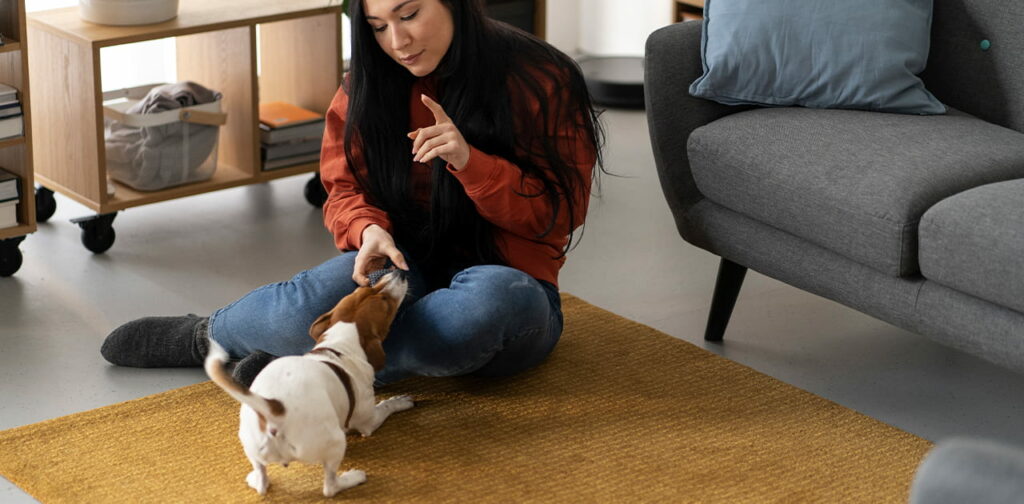Unlike us, our little puppies can not talk. Rather they communicate through various manners. Barking is one of them. Our puppies may sound just cute while barking, but sometimes it can get out of hand.
Therefore, it is important for us to know what they are trying to say by barking like that. As a professional dog groomer I have worked with these adorable little puppies with terrible barking manners.
If you are going through something similar, do not worry! I have juggled down everything you need to know. From why your puppy may be barking too much to why this problem needs to be immediately dealt with. Also how to stop a puppy from barking.
Take a quick read to help your puppy calm down today.
Table of Contents
Toggle
Why do puppies bark?
Puppies often bark to express themselves as they can not talk. If your puppy is barking to the point that it is no longer a common behaviour you may want to know what is causing this issue and how to stop puppy from barking. Take a look for the causes below to understand why your puppy is barking too much.
Communication
Puppies often try to communicate through barking at you. Remember, your little friend runs to you and starts barking as soon as you get home. Your puppy is trying to communicate their happiness at that point.
Likewise there could be things your puppy may want to let you know, so they bark to communicate.
Attention-seeking
As regular people we often get busy, overlooking our puppy’s need for our company. Puppies are like little kids. They need a lot of attention and love. They can easily feel restless when ignored.
They may just want you to spend some time with them, have a little walk or a playtime outside. To get your attention they will bark.
Fear or Territoriality
Puppies can easily sense threats in the environment. Little puppies are very new to the world and can easily feel overwhelmed by their environment. New people or other animals can make them feel unsafe. Additionally, puppies can get a little territorial as it is the nature of the species.
In case some other animal enters their space they can again feel threatened and bark aggressively.
Separation Anxiety
They can also easily get attached to you and develop separation anxiety in case you leave them for a little while. It is important to take preventive measures for separation anxiety. For example , alone time and socialization.
Boredom or Excitement
Your puppy can bark in boredom as well as excitement. Our little pups can easily get fascinated by the world around them. They can easily get curious as well. In excitement they can bark.
Likewise, when your puppy is bored they may want to get your attention to enjoy some fun time with you. They can also get frustrated and end hup hysterically barking.
Pain or Discomfort
Puppies may bark in pain or discomfort to communicate their distress and seek assistance. It’s a natural response to alert their owners to potential health issues or discomfort.
Leaving your puppy hungry for too long, disruption in their feeding schedule or potty schedule can cause discomfort. These issues can be stomach discomfort, injuries, dental issues, or musculoskeletal pain.
Lack of behavioral Management Training
If your puppy is not well trained they are more likely to act disobedient as they do not know what is the desired behavior and what will make you happy.
Assume, if you have not leash trained or , crate trained your puppy and all of a sudden due to some urgency you have to put on a leash or put them in a crate, will they feel comfortable? Of course, they will feel discomfort and threatened.
As a reaction they will start barking aggressively.

The negative effects of excessive barking
Before getting into how to stop puppy from barking it is important to know how it affects you and your puppy. Excessive barking is not only a matter of inconvenience it can disrupt the wellbeing of you, your puppy, and the people or pets that are around.
Have a look at the effects of excessive barking of your puppy.
Sleep Disruption
If your puppy is barking all night you will not be able to sleep, and neither will anyone else in the neighborhood. You will get a lot of complaints and it will affect not only your sleep and peace but also your reputation. Let’s not forget how your puppy is suffering as well.
As excessive barking often stems from some sort of problem. Your puppy may be in pain or discomfort. Barking at night will definitely disrupt their sleeping pattern.
Disruption in Puppy’s Health
Excessive barking can cause stress, anxiety, and fatigue in puppies. It may also strain their relationships with owners and lead to negative consequences such as increased isolation or behavior. This will affect their wellbeing and health terribly.
Social Disruption
Nobody loves an unsocialized pet. More so, if they are acting aggressive as well. A barking puppy is unpleasant to your friends and family. This will eventually affect your social life causing you to self isolate from socialization.
According to research, many puppy parents can face social isolation due to the barking manner of the puppy. Not all puppies who bark bite as well but people may always feel uncomfortable around them.

Effective ways to stop puppy barking
As of now you have definitely realized you can not at any cost keep up with this behavior and risk your little friends wellbeing. I have worked with so many puppies over the years and helped their owner to correct this barking behavior, through proper grooming techniques.
I have created a step by step guide on how to stop puppy from barking in only 5 steps.
Step 1: Start the trainings
As daunting and tiring the behavioral management training can sound, it can also be fun with your little puppy. Start with obedience training and move to other training like, potty training, crate training, leash training, alon time training, early socialization, take your puppy to meet an older dog or a relative etc.
Step 2: Implement positive reinforcement, mental and physical stimulation
To stop barking, use positive reinforcement by rewarding quiet behavior with treats or praise. For example, pick a delicious puppy food and teach the “quiet” command and reward good behavior.
When your puppy remains quiet instead of barking at the doorbell, immediately reward them with a treat to reinforce the desired behavior. To ensure their overall wellbeing ensure regular exercises and a good amount of playtime.
Step 3: Consult an well experienced veterinarian
Meet an experienced vet and get a pepper diagnosis of the physical wellbeing of the puppy. Ensuring your puppy is physically healthy is the optimal priority. Your vet can check them up and offer personalized guidance uniquely designed for your puppy.
They will help you to remove or minimize triggers for barking and create a safe environment for your puppy.
Step 4: Build a strong bond with your puppy
With puppies it is important you establish your leadership in the very beginning of businding your relationship with your puppy. Accordingly, bullying a sense of trust and comfort is also important. Your puppy should have trust in you to take care of them and return back to them eventually.
So, even if you have a sudden busy day or a sudden environment change your puppy can feel confident to adapt to it and not repeat the barking behaviors.
Step 5: Avoid Common Mistakes.
While following this guide of how to stop puppy from barking in 5 steps, you must avoid some common mistake which can wash away all your efforts. To start with, avoid giving treats to your puppy to calm down. They will repeat the behavior to get more treats.
Accordingly, refrain from punishing them this will make them even more unsettled. Also ignore attention seeking barking. Do not approach making random changes until you have identified the underlying reason behind abnormal barking of your puppy.
Consult a vet to help you identify the issue.
Conclusion
Our little pups are always in need of our love and support, even when they are acting unbearably disobedient. Puppies do not bark for no reason. It is important to take proper measures needed to help them through this phase of their life.
Just like any other behavioral issues in puppies, excessive barking can be solved when you identify the reason, depth and remedy of it. We hope you get to build a stronger bond with your puppy throughout this experience.





